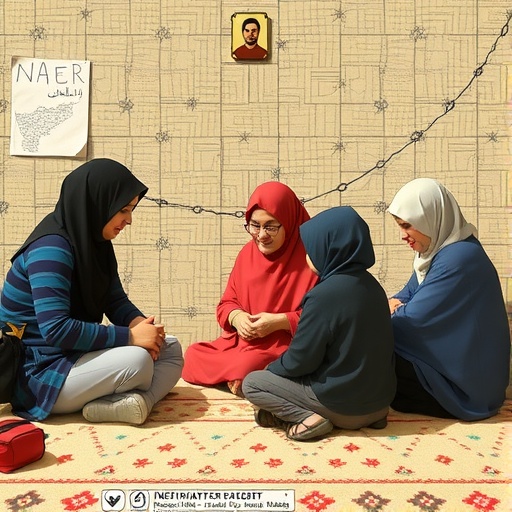In a groundbreaking study published in the esteemed journal “Health Research Policy and Systems,” researchers have delved into one of the most pressing issues in public health today: the social determinants of health in Iran. Titled “Identifying Knowledge Gaps in Social Determinants of Health and Related Challenges in Iran,” this research, led by Bakhtiari et al., seeks to illuminate the intricacies of how various social factors influence health outcomes, particularly in the context of a rapidly changing society like Iran.
The concept of social determinants of health encompasses a spectrum of conditions under which people are born, live, work, and grow old, shaped by the distribution of money, power, and resources at global, national, and local levels. For many, these determinants are the key factors that dictate life expectancy, quality of life, and access to healthcare services. The research team has identified a significant gap in the understanding and integration of these elements into health policies within Iran, prompting a thorough examination that is desperately needed in the region.
In Iran, a country rich in culture and history but also grappling with its own unique set of challenges, the socio-economic landscape is particularly complex. Factors such as economic insecurity, educational disparities, and socio-political instability contribute significantly to the overall health of its population. The study emphasizes that without addressing these root social determinants, public health initiatives may fall short in effectively improving health outcomes. The researchers highlight the importance of incorporating a social justice framework in policies and interventions aimed at enhancing public health.
The team performed a comprehensive review of existing literature, identifying significant inconsistencies and gaps in the knowledge related to social determinants of health specific to Iran. They found that while there has been some progress in identifying national health policies, the translation of these policies into actionable programs that address social determinants remains inadequate. The lack of empirical research focused on marginalized populations, particularly in rural areas, was notably alarming.
Moreover, the researchers advocated for more nuanced approaches to public health that go beyond mere health statistics. They argued that understanding the lived experiences of individuals is crucial for framing effective health policies. Through qualitative studies and inclusive research methodologies, the voices of those most affected by health inequalities can be amplified, thus contributing to a more informal narrative within the public health discourse.
The findings of this research are particularly relevant in light of recent global health crises, such as the COVID-19 pandemic, which underscored the importance of social factors in health outcomes. The pandemic revealed stark disparities in health systems across different socio-economic groups, highlighting the necessity for integrated approaches that prioritize social determinants. In Iran, the pandemic exacerbated existing inequalities, emphasizing the urgent need for a greater focus on social factors in health planning and policy formation.
Furthermore, the study addressed the role of education as a pivotal determinant of health. In Iran, where educational attainment often dictates job opportunities and, by extension, economic stability, there was a clear correlation between education and health outcomes. The researchers noted that those with higher educational levels typically enjoy better health, prompting calls for policies that ensure equitable access to quality education. This would not only improve health outcomes but also promote social mobility.
The research team also explored cultural factors, acknowledging that social norms and beliefs significantly influence health behaviors and perceptions. Understanding how culture interacts with social determinants can help inform more culturally sensitive health interventions. The nuances of Iranian culture, including its traditions, values, and social structures, must be considered when developing health policies aimed at improving health equity.
Looking forward, Bakhtiari et al. urge decision-makers to prioritize funding for research that explores the social determinants of health. They stress that establishing effective partnerships between government, academic institutions, and community organizations is essential for fostering a more comprehensive understanding of these determinants. Such collaborations can enhance data collection, promote knowledge sharing, and ultimately lead to more effective interventions that can bridge the gaps identified in the study.
In summary, the research conducted by Bakhtiari and their colleagues is a clarion call for action in addressing the inequities fostered by social determinants of health in Iran. By illuminating these gaps and providing a framework for understanding, this study serves as a foundation upon which future research and policy must be built. The implications of these findings extend beyond Iran, offering valuable insights for other nations grappling with similar challenges.
The importance of this research cannot be overstated—addressing social determinants of health is not merely an academic exercise; it is a pathway to a healthier, more equitable future for all citizens. Policymakers, researchers, and healthcare professionals alike must take heed of these findings and work collaboratively to create an environment where health equity is not just an aspiration but a tangible reality.
As this research paves the way for future investigations, it holds the potential to inspire a global movement that recognizes the fundamental role of social factors in shaping health outcomes. The challenge lies in translating these insights into action, forging partnerships that foster innovative solutions to the complex health issues faced by populations worldwide.
The study concludes with a fervent hope for a future where health disparities are minimized, and all individuals, regardless of their social circumstances, have the opportunity to achieve optimal health.
Subject of Research: Social determinants of health in Iran
Article Title: Identifying knowledge gaps in social determinants of health and related challenges in Iran
Article References: Bakhtiari, A., Mostafavi, H., Mohamadi, E. et al. Identifying knowledge gaps in social determinants of health and related challenges in Iran; 2023. Health Res Policy Sys 23, 63 (2025). https://doi.org/10.1186/s12961-025-01300-4
Image Credits: AI Generated
DOI: 10.1186/s12961-025-01300-4
Keywords: Social determinants of health, Iran, health policy, health equity, educational disparities, cultural factors, public health, research gaps




